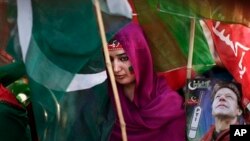QUETTA, PAKISTAN —
Although women make up roughly half of Pakistan’s population, in the southwestern province of Baluchistan their turnout for national elections has been much lower.
Committed to making a difference in upcoming elections for a new national assembly, however, some women say they are determined to have their votes counted on May 11.
In this volatile and conservative southwestern province, political candidate Ruqqaya Hashmi said she is a role model; as a woman and member of the targeted Hazara Shi’ite minority, she said her campaign carries considerable risk.
“I have been receiving threats for the last few days now," she said, declining to specify who is making the threats. "My movements now [are] limited. I came here [under] camouflage; I changed my clothes, I changed my driver, I changed my car.”
The election-related attacks and threats have made some women voters like Humaira Yasmeen nervous about going to the polls.
“Given the situation here, women cannot move freely. Going out is a problem," she said. "It will be very difficult for women to cast their votes, because the conditions are such that if we leave the house and there is no security, what are we going to do? It is risky, life-threatening. And, nothing is more important than life."
Another challenge, said Farah Naz, a worker with a non-governmental organization, is getting women to vote autonomously.
“The biggest problem among women is they are not taught how to vote, they depend on their men," she said. "They do exactly as they are told by their men. They should cast their votes independently.”
With the campaigning curtailed by violence, candidates are reaching women voters through TV and radio advertisements, instead of holding large rallies.
University students in Quetta such as Kanza Shakeel, who said she is fed up with insecurity and unemployment, appear determined to have their voices heard.
“The old leaders, who are just leading Pakistan from last years, I don’t want that they came again," she said. "I just want this kind of change: that new people [are elected], not the old people who are just doing and just promoting themselves by commercial, paid commercial. I am just hating them.”
With low turnout expected on election day, those women who brave the threats to go to the polls could have a larger influence in shaping the country’s next government.
Committed to making a difference in upcoming elections for a new national assembly, however, some women say they are determined to have their votes counted on May 11.
In this volatile and conservative southwestern province, political candidate Ruqqaya Hashmi said she is a role model; as a woman and member of the targeted Hazara Shi’ite minority, she said her campaign carries considerable risk.
“I have been receiving threats for the last few days now," she said, declining to specify who is making the threats. "My movements now [are] limited. I came here [under] camouflage; I changed my clothes, I changed my driver, I changed my car.”
The election-related attacks and threats have made some women voters like Humaira Yasmeen nervous about going to the polls.
“Given the situation here, women cannot move freely. Going out is a problem," she said. "It will be very difficult for women to cast their votes, because the conditions are such that if we leave the house and there is no security, what are we going to do? It is risky, life-threatening. And, nothing is more important than life."
Another challenge, said Farah Naz, a worker with a non-governmental organization, is getting women to vote autonomously.
“The biggest problem among women is they are not taught how to vote, they depend on their men," she said. "They do exactly as they are told by their men. They should cast their votes independently.”
With the campaigning curtailed by violence, candidates are reaching women voters through TV and radio advertisements, instead of holding large rallies.
University students in Quetta such as Kanza Shakeel, who said she is fed up with insecurity and unemployment, appear determined to have their voices heard.
“The old leaders, who are just leading Pakistan from last years, I don’t want that they came again," she said. "I just want this kind of change: that new people [are elected], not the old people who are just doing and just promoting themselves by commercial, paid commercial. I am just hating them.”
With low turnout expected on election day, those women who brave the threats to go to the polls could have a larger influence in shaping the country’s next government.




